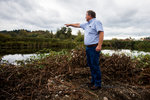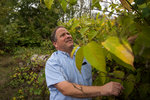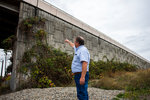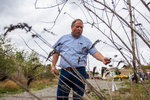



As invasive species continue to strain resources across the state, Lewis County is poised to join a majority of Washington counties that impose a property tax to fund its Noxious Weed Board.
County commissioners voted Monday to schedule an Oct. 22 hearing that would finalize the shift, moving the Noxious Weed Board out of the county’s general fund and paying for it with a new property tax that would come to $8 a parcel for county property owners.
In addition to reducing strain on the county’s general fund, the move would bump the Board’s funding up to about $300,000, which would give it more resources to deal with growing invasive plant threats. The agency is currently funded at about $215,000.
“One of the things that the commissioners have been addressing is just trying to reduce the impacts to the general fund, so that they don’t keep pulling money out of reserves to fund programs in the general fund,” said weed board Coordinator Bill Wamsley. “The county sets up a dedicated fund where those funds can just be used for noxious weed control.”
The state gives counties the power to levy the property tax to fund such boards, and according to Wamsley, 62 percent of counties have already done so.
“I think the rate they’re proposing and what the weed board has come to, it seems fair and consistent with other county programs,” Wamsley said.
The Noxious Weed Board’s primary role is to educate landowners, identify county-owned areas that need treatment and enforce compliance with state laws requiring treatment of properties. The funding shift could allow it to better meet that mission.
“We’ve had our tin cup out, and we’ve applied for grants,” Wamsley said. “Are we able to get to all the people when they call up and inquire about weeds? Are we able get to everybody who calls up and says, ‘Hey my neighbor’s got a problem.’ … (The increased funding) would mean being able to have a staffing level that can respond to landowners with their need for technical assistance. Providing resources to landowners, whether it’s hand tools like weed wrenches or a backpack sprayer or something like that.”
Having those resources available is important, Wamsley said, as the threat posed by invasive species is mounting throughout the state. Plants like Scotch broom and knotweed have taken hold in rural areas, while poison hemlock and giant hogweed pose dangers in urban environments. According to a study conducted by the Washington State Department of Agriculture, Lewis County stands to sustain $6.2 million in losses as Scotch broom invades rangeland and wildland areas.
“We see locally things like Scotch broom that have a big impact on our producers and natural resources,” Wamsley said. “The small forest landowner who just harvested some timber — Scotch broom is a big deal in terms of reestablishing that forest. The last couple years, it’s just been amazing how many foresters and small forest landowners have had failures of reestablishing seedlings as a result of weed pressure.”
Lewis County faces another challenge, as about one third of its land is federally owned, meaning officials are unable to collect taxes on those parcels as they collects funds for the Noxious Weed Board. Tribal lands are exempt as well. Much of the task of fighting back against invasive species will fall to landowners, with whom the legal obligation ultimately lies. The property tax funding will give the Board adequate resources to inform and advise, but not enough to conduct all the treatment that is required.
“Eight dollars isn’t going to spray your 100 acres of weeds,” Wamsley said.
Given the time necessary for levies to be put into effect and added to budgets, Wamsley said the Noxious Weed Board likely wouldn’t see an increased staffing level until late 2019 or 2020.